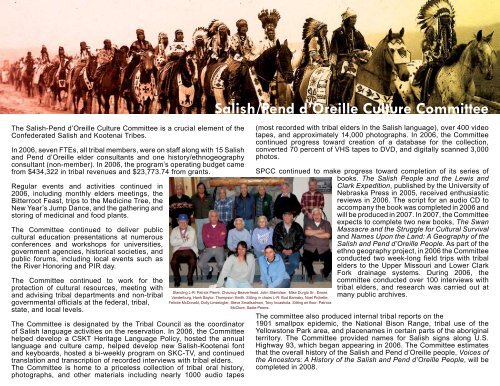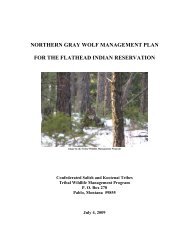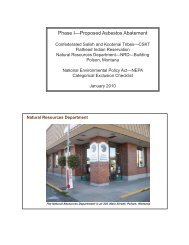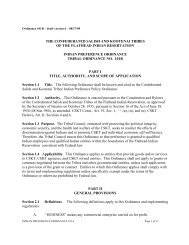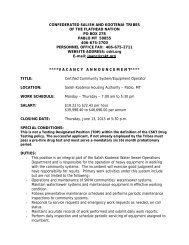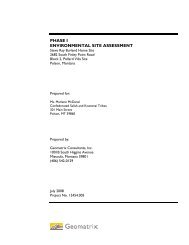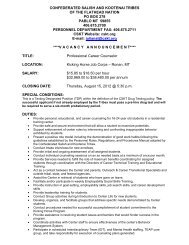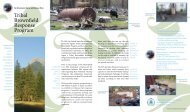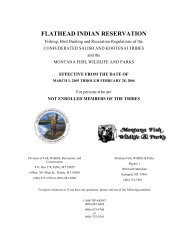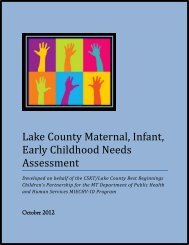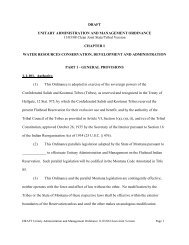2006 annual report - cskt - Confederated Salish and Kootenai Tribes
2006 annual report - cskt - Confederated Salish and Kootenai Tribes
2006 annual report - cskt - Confederated Salish and Kootenai Tribes
Create successful ePaper yourself
Turn your PDF publications into a flip-book with our unique Google optimized e-Paper software.
The <strong>Salish</strong>-Pend d’Oreille Culture Committee is a crucial element of the<br />
<strong>Confederated</strong> <strong>Salish</strong> <strong>and</strong> <strong>Kootenai</strong> <strong>Tribes</strong>.<br />
In <strong>2006</strong>, seven FTEs, all tribal members, were on staff along with 15 <strong>Salish</strong><br />
<strong>and</strong> Pend d’Oreille elder consultants <strong>and</strong> one history/ethnogeography<br />
consultant (non-member). In <strong>2006</strong>, the program’s operating budget came<br />
from $434,322 in tribal revenues <strong>and</strong> $23,773.74 from grants.<br />
Regular events <strong>and</strong> activities continued in<br />
<strong>2006</strong>, including monthly elders meetings, the<br />
Bitterroot Feast, trips to the Medicine Tree, the<br />
New Year’s Jump Dance, <strong>and</strong> the gathering <strong>and</strong><br />
storing of medicinal <strong>and</strong> food plants.<br />
The Committee continued to deliver public<br />
cultural education presentations at numerous<br />
conferences <strong>and</strong> workshops for universities,<br />
government agencies, historical societies, <strong>and</strong><br />
public forums, including local events such as<br />
the River Honoring <strong>and</strong> PIR day.<br />
The Committee continued to work for the<br />
protection of cultural resources, meeting with<br />
<strong>and</strong> advising tribal departments <strong>and</strong> non-tribal<br />
governmental officials at the federal, tribal,<br />
state, <strong>and</strong> local levels.<br />
The Committee is designated by the Tribal Council as the coordinator<br />
of <strong>Salish</strong> language activities on the reservation. In <strong>2006</strong>, the Committee<br />
helped develop a CSKT Heritage Language Policy, hosted the <strong>annual</strong><br />
language <strong>and</strong> culture camp, helped develop new <strong>Salish</strong>-<strong>Kootenai</strong> font<br />
<strong>and</strong> keyboards, hosted a bi-weekly program on SKC-TV, <strong>and</strong> continued<br />
translation <strong>and</strong> transcription of recorded interviews with tribal elders.<br />
The Committee is home to a priceless collection of tribal oral history,<br />
photographs, <strong>and</strong> other materials including nearly 1000 audio tapes<br />
<strong>Salish</strong>/Pend d’Oreille Culture Committee<br />
St<strong>and</strong>ing L-R: Patrick Pierre, Chauncy Beaverhead, John Stanislaw, Mike Durglo Sr., Eneas<br />
V<strong>and</strong>erburg, Hank Baylor, Thompson Smith. Sitting in chairs L-R: Bud Barnaby, Noel Pichette,<br />
Felicite McDonald, Dolly Linsebigler, Steve Smallsalmon, Tony Incashola. Sitting on floor: Patricia<br />
McClure, Sadie Peone.<br />
(most recorded with tribal elders in the <strong>Salish</strong> language), over 400 video<br />
tapes, <strong>and</strong> approximately 14,000 photographs. In <strong>2006</strong>, the Committee<br />
continued progress toward creation of a database for the collection,<br />
converted 70 percent of VHS tapes to DVD, <strong>and</strong> digitally scanned 3,000<br />
photos.<br />
SPCC continued to make progress toward completion of its series of<br />
books. The <strong>Salish</strong> People <strong>and</strong> the Lewis <strong>and</strong><br />
Clark Expedition, published by the University of<br />
Nebraska Press in 2005, received enthusiastic<br />
reviews in <strong>2006</strong>. The script for an audio CD to<br />
accompany the book was completed in <strong>2006</strong> <strong>and</strong><br />
will be produced in 2007. In 2007, the Committee<br />
expects to complete two new books, The Swan<br />
Massacre <strong>and</strong> the Struggle for Cultural Survival<br />
<strong>and</strong> Names Upon the L<strong>and</strong>: A Geography of the<br />
<strong>Salish</strong> <strong>and</strong> Pend d’Oreille People. As part of the<br />
ethno geography project, in <strong>2006</strong> the Committee<br />
conducted two week-long field trips with tribal<br />
elders to the Upper Missouri <strong>and</strong> Lower Clark<br />
Fork drainage systems. During <strong>2006</strong>, the<br />
committee conducted over 100 interviews with<br />
tribal elders, <strong>and</strong> research was carried out at<br />
many public archives.<br />
The committee also produced internal tribal <strong>report</strong>s on the<br />
1901 smallpox epidemic, the National Bison Range, tribal use of the<br />
Yellowstone Park area, <strong>and</strong> placenames in certain parts of the aboriginal<br />
territory. The Committee provided names for <strong>Salish</strong> signs along U.S.<br />
Highway 93, which began appearing in <strong>2006</strong>. The Committee estimates<br />
that the overall history of the <strong>Salish</strong> <strong>and</strong> Pend d’Oreille people, Voices of<br />
the Ancestors: A History of the <strong>Salish</strong> <strong>and</strong> Pend d’Oreille People, will be<br />
completed in 2008.


